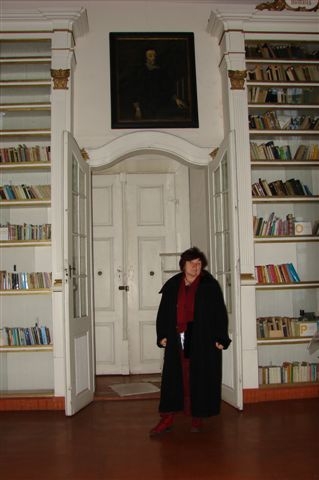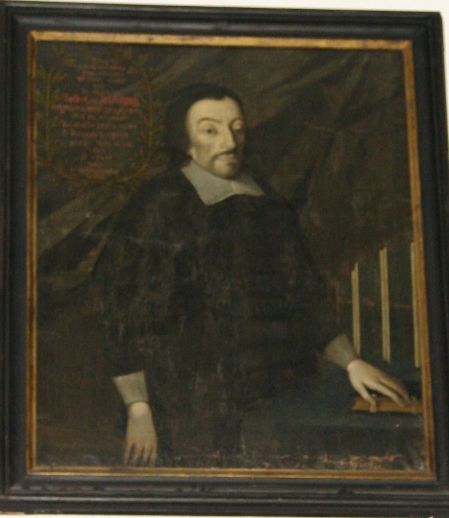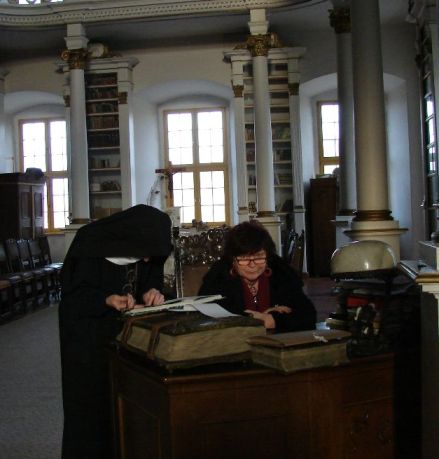|
|
philosopher and physician, b. Dec 25, 1624 in Wrocław, died there on December
9, 1697. In 1653 he converted from Protestantism to Catholicism and at
confirmation took the name Angelus (angel) by which he was thereafter known.
In 1643, having finished studies in the Gymnasium of St. Elizabeth in Wrocław,
he started medical studies in Strasburg. After a year he moved to Holland where,
along with medicine, he studied philosophy in Leiden and made the acquaintance
of the mystic Jacob Böhme and learned about Spanish mysticism. Two years later
he moved to Padua where he received the title of doctor of medicine and
philosophy. He ordered that they should write on his diploma “son of Polish
gentry”.
In 1648 he returned to Wrocław and took a post as
physician with King Silvius Nimrod at the castle in Bierutów. With time he
obtained a more lucrative post as court physician in the castle of the prince in
Oleśnica. There he made the acquaintance of the Noble A. von Franckenberg of
Bystry near Oleśnica. The noble was a precursor of the Christian
ecumenism and the first biographer of Jacob Böhme. Angelus Silesius and
Franckenberg shared a fascination with mysticism. After Franckenberg’s death in
1652, Angelus inherited his valuable library, including a book by Daniel Czepko
called Monodisticha which would be of special importance in his
masterpiece Cherubic wanderer. Daniel Czepko’s work was not yet
published at the time. In the same year Angelus Silesius left his court position
and returned to Wrocław. In 1653 after his conversion to Catholicism he
published the famous text Gründliche Ursachen und Motive [Basic Causes
and Motives] in which he explained why he left Lutheranism and entered the
Catholic Church. The work produced an angry reaction among his former
co-religionists. For several years many malicious and insulting lampoons of
Angelus Silesius were published in Lutheran circles. Unexpectedly Angelus
Silesius became the chief spokesman for the counter-reformation in Lower
Silesia. For twenty years he fought Lutheranism. He wrote fifty polemical works
in this campaign. In 1661 Angelus Silesius was ordained a priest in Nysa.
|
Mother of
Sybillianismus
studing worth
1000000zł Bible
in
Krzeszow Church |
|
 |
|
 |
The
Cherubic Wanderer, described as Angelus Silesius’s masterpiece,
appeared first in Vienna in five books in the form of religious verse
Gestreiche Sinn- und Schlußreime, then a sixth book was added and it was
published under its known title of Cherubinischer Wandersmann (Glatz
1675²). In the introduction, Angelus Silesius informs his readers that he will
speak in a language of paradoxes contrary to rational speech and cites
Tertullian: credo quia absurdum. By rejecting the principle of
non-contradiction which he regards as too narrow and limited to touch reality
itself, Angelus Silesius sees the basic picture of constantly regenerated living
reality.
The verses in the Cherubic Wanderer fascinate and at the same time
shock the reader with their logic of paradox. Love is the dominant motif in the
verses. Love is “Our God”. “Everything lives by Love”. Love is the magnet that
“pulls me to God.” What is “still greater”—“love pulls God into death”. Adam
Mickiewicz first introduced the views of the Silesian mystics and their French
follower Saint Martin to Polish literature. In volume VIII of Poezja
[Poetry] (P 1836), Mickiewicz included a collection of verse called Zdania i
uwagi. Z dzieł Jakuba Bema, Anioła Ślązaka (A. Silesius) i Św. Martena
[Sentences and remarks. From the works of Jacob Böhme, Angelus Silesius, and St.
Martin]. Mickiewicz’s friend L. Siemieński wrote an article Anioł Ślązak
[Silesian Angel] in the cycle Portrety Literackie [Literary Portraits]
(Pz 1875).
|
|
In Polish translation the following works have been published in the edition
of J. Jackowski—Anioła Ślązaka pątnik anielski: rymy w duchu bogate,
stateczne i ostateczne [Angelus Silesius’ angelic pilgrim: rhymes rich,
sublime, and ultimate in spirit] (Wwa 1924); Pątnik anielski [Angelic
pilgrim] (Wwa 1937); Cherubowy wędrowiec [Cherubic wanderer] (first
book, ed. J. Prokopiuk, Kr 1990); Wybór Wierszy [Selection of verses]
(ed. B. Antochewicz, Wr 1992).
Le mystique d’Angelus Silesius, P 1943; J. Bamzi, Création
religieuse et pensée contemplative, P 1951; J. Sammon, Angelus Silesius,
NY 1967; T. C. von Stockun, Zwischen Jakob Böhme und Johann Scheffler.
Abraham von Franckenberg (1593–1652) und Daniel Czepko von Reigersfeld
(1605–1660), A 1967; H. Föllmi, Czepko und Scheffler. Studien zu
Angelus Silesius “Cherubinische Wandersmann” und Daniel Czepko “Sexcenta
monodisticha Sapientum”, Z 1968; G. Strenger, Ohne Waum. Versuch eirner
Phänomenologie des Unkundes im Anschluss aus dem “Cherubinischer wandersmann”
von Angelus Silesius, Es 1990.
Józef Kosian
|
 |
|

